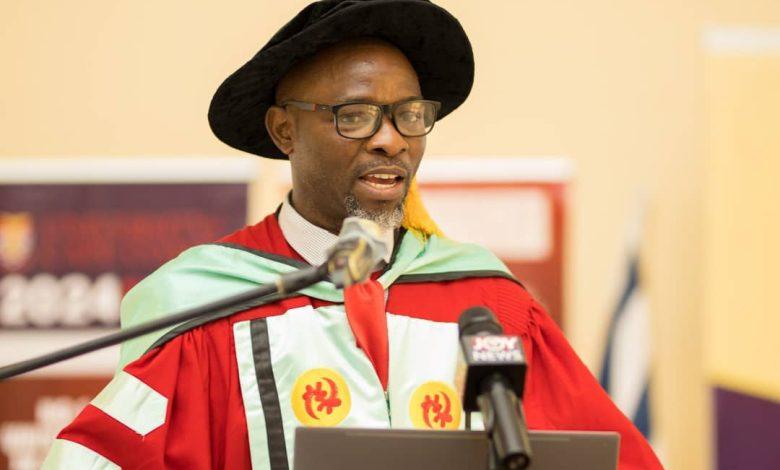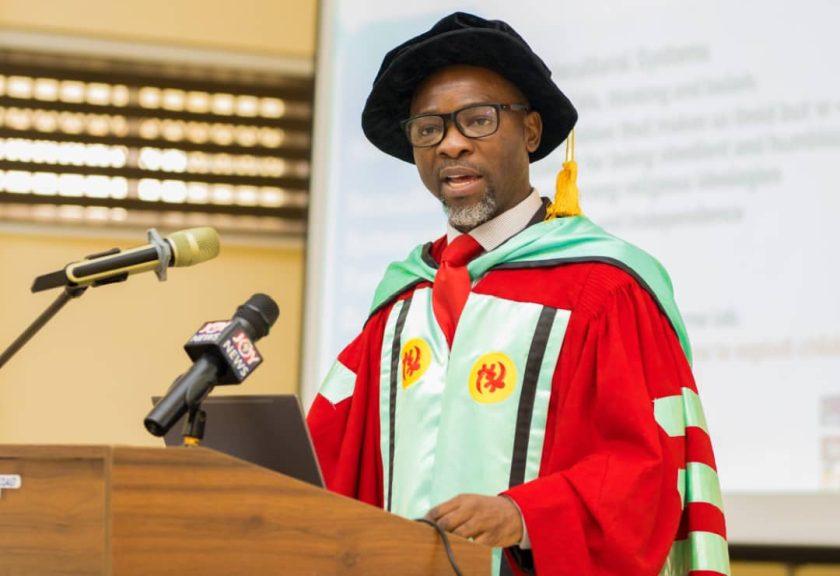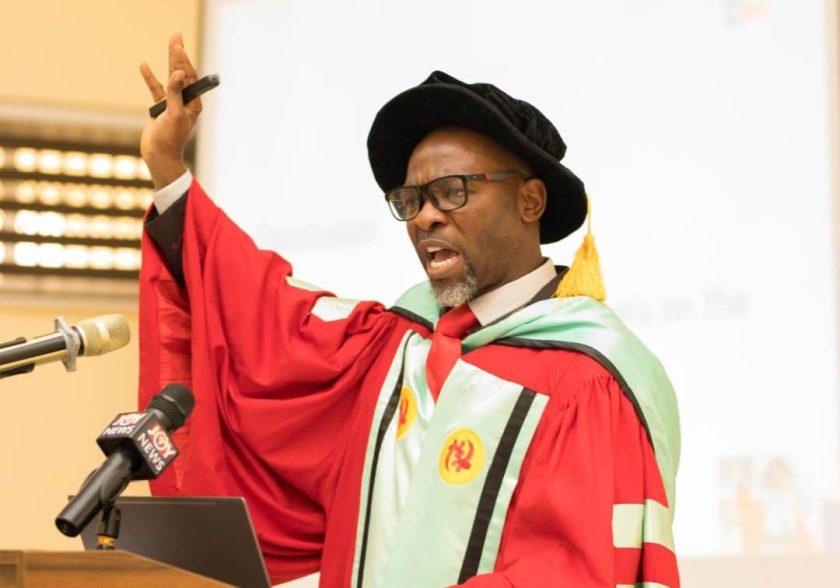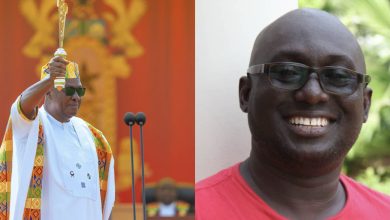Prof. Daniel Agyapong to government; addressing SME development ‘Monters’ key to reducing unemployment in Ghana

The Director of the Directorate of Academic Planning and Quality Assurance, University of Cape Coast, Prof. Daniel Akwasi Agyapong has delivered his Inaugural Lecture with a call on government to address the challenges confronting Small and Medium Enterprises’ development .
He stated that with over hundred thousand of graduates leaving universities yearly, SME scalling up and expansion could be the panacea for graduate unemployment in Ghana.
The Finance and Entrepreneurhip Scholar made these remarks during his Inaugural Lecture held at the School of Graduate Studies auditorium on Thursday, February 1, 2024 on the topic “Entrepreneurship and Small Enterprises’ Development Night Journey: The Road Monsters, Fairies, and Angels”.
He set the ball rolling by giving a global, continental and domestic picture of the SME’s situation. He said “There is an estimated 332.99 m SME’s in 2021, an increase of 1.4% over the 2019 figure of 328.33m. The propensity for start-ups increased on average by 30% over 49 countries”, he posited.
On the continental level, he revealed that countries such Kenya, Algeria, and Angola drove the increase in the number for SME’s and Entrepreneurhip adding “Sub-Sahara Africa accounted for over 43.8% for early stage deals between 2018-2022”, avered Prof. Agyapong.
The Director of the Directorate of Academic Planning and Quality Assurance however hinted that Accra is emerging as one of West-Africa’s fastest growing tech hubs with start-ups raising $212 million in capital in 2022.
Prof. Agyapong referenced the exploding youth population and the number of graduates universities are churning out yearly to prove a point to his audience why Ghana should be intentional about SMEs and Entrepreneurhip.
“According to GTEC, 2023, in 2018/2019, 106,499 graduates completed universities. This decreased a little to 105,721 in 2019/2020 but, inched up again to 107,263 graduates in 2020/21 academic year”, quizzing, is the country able to provide jobs to meet these increasing numbers?
Again, he underscored the fact that, SME’s and Entrepreneurhip failure rate in Africa is high of about 54% with Ghana ranking 3rd with 74% failure rate after Ethiopia(75%) and Rwanda (75%).
Further, he argued that with this failure rate of SME’s and Entrepreneurhip in Ghana, the country in 2022 alone imported $400m worth of tomatoes from Burkina Faso. Mineral water, fruit juice, poultry, detergents etc are also imported and he quized again, “Can’t our SME’s be strengthened to produce these products locally?”
Incidentally, he avered that for SME’s to do well and for the failure rate to decline, the country needs to deal with the ‘Monsters’, Fairies’ and Angels’ within the SMEs and Entrepreneurship sector.

Monsters according to the Professor of Finance and Entrepreneurhip are normally imaginary or mythical creatures that evoke fright or fear and/or a perception of threat or harm. Within the SME’s and Entrepreneurhip sphere, the monsters within the venture are: employees who steal from the venture, employees who spread negative and discontent and create toxic work environment and poor customer service care.
On the hand, the Monters who militate against SME’s and Entrepreneurhip from the outside of the venture are: Business Angels that take over start-ups, Microfinance Institutions that offer 5% interest per month, customers who buy on credit but never pay, wicked rent and general state of the economy and the tax regime in Ghana.
Fairies in the view of Prof. Agyapong are mythical beings often associated with enchantment and magic with very unpredictable behaviour. These Fairies within the scope of his lecture are divided into 2, namely; Household Fairies to include employees, families, friends and community members with the perception that once someone owes a business then automatically, the person is rich.
The second group he calls Manipulative Siren Fairies which include competitors who use deceitful tactics or false promises to lure customers away and promises from spiritualist and politicians which cannot be relied upon.
The Finance and Entrepreneurhip Scholar explained the angels to mean spiritual beings often associated with guidance, protection and benevolence. In the case of SME’s and Entrepreneurhip, he categorised them into 3.
Firstly, the Healing Archangels to mean stakeholders (investors, partners) who step in times of crises to provide resources or offer strategic advise to help the business recover from the setbacks, aiding in the business resilience.
Secondly, The Protective Cherubim to mean families and community sheilding the company from external challenges and lastly, the Guardian Angels who are the loyal customers who offer constructive feedback, and actively promote the venture’s product.
In proffering some solutions to the myriad of problems associated with SME’s and Entrepreneurhip in Ghana, he emphasised three broad areas, viz policy, programmes and practice that needs to be addressed urgently if we are to made any meaningful headway in SME’s and Entrepreneurhip.
The country needs to develop a policy framework for SME’s and Entrepreneurhip to include having a complete database of MSMEs, Entrepreneurhip and Start-up Act to streamline SME’s and Entrepreneurhip, and a National Guide to Entrepreneurhip Curriculum Design.
On the programmes side, he avered the country needs an Entrepreneural Curriculum fostering teaching and learning, and entrepreneurship at the school level. Entrepreneurship and Design Thinking Centres should be made available to help those who require some assitance and Technology Parks to stimulate the entrepreneural drive in people.

With practice, he proposed that, the government must develop a Financial Support Scheme or Act to regulate and streamline SMEs and Entrepreneurship sector. He argued that the current party manifesto driven financial support to SMEs isn’t sustainable and hasn’t yield any positive results.
Again, he suggested that there should be a Monitoring and Evaluation Systems to follow up on SMEs and Entrepreneurship development and also proposed a stronger collaboration between industry and universities where industry problems would be research interest for academics. These can help develop our SMEs and Entrepreneurship thereby contributing emensely to the reduction in graduate unemployment.
Daniel Akwasi Agyapong is a Professor of Finance and Entrepreneurship. He holds a PhD and MPhil in Finance; Postgraduate Diploma in Entrepreneurship; Bachelor of Management Studies; Associate Member, Chartered Institute of Marketing (UK) with Professional Postgraduate Diploma in Marketing; Licentiate Member, International Professional Managers Association (UK) with a Postgraduate Diploma in Management. He was the Head of Programmes, Unit of Art and Social Sciences, College of Distance Education, University of Cape Coast and currently the Director (Directorate of Academic Planning and Quality Assurance). He is an SME and Problem Based Learning Trainer. He has over 70 research outputs in the area of financing SMEs, green and sustainable business finance and Sustainable SME development.
He has been involved in the implementation of both local and international projects including BET Ghana Project, GIZ ComCashew Project, Switch Africa Green Project; Codeshare Teaching and Learning, E-waste Management in Ghana, Graduate Enterprise Development Initiative, Participatory Appraisal of Competitive Advantage, Building Bridge Across Continents, Partnership for Applied Sciences project, German-African University Partnership Platform for the Development of Entrepreneurs and Small/Medium Enterprises.





